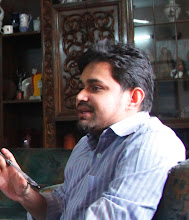It is sometimes said by critiques that since independence, the country did not find enough notable poets. Being a leading poet in the country, how do you asses the contemporary poets? 
photo by Al-Emrun Garjon
I have a different opinion about the poets and poetry of present time. I think poetry develops very silently. In every decade, there must be five or six leading poets. I do not think this decade is any different.
Thursday, 29 April 2010
‘The library culture has not developed in our country’
We cannot fulfill the demand because of illegal lines’
There is a crisis for water every year during this season. Unfortunately, the situation is apparently worsening as time goes on. What do you think are the reasons behind the crisis? 
photo by Prito Reza
The shortage of water does not trouble the legal subscribers. WASA has enough supply of water to meet the existing legal demand. Unfortunately, there are a good number of illegal connection holders around the Dhaka city. Because of them, we cannot fulfill the demand.
There are mainly two reasons as to why the crisis for water becomes acute in this season. Firstly, the level of underground water is down and secondly, because of constant load shedding, the pumps do not work. As a result, the water supply of a certain area just collapses. Normally, we have a demand of 205 crore litre but we produce 190 or 195 crore litre.
Monday, 26 April 2010
From food to factories
It was 4pm. Lunch was yet to be cooked in Shahana Islam’s household, as her family, including her six-year-old child, anxiously waited for the gas supply to return. It had been unavailable for five hours till that point, with no certainties as to how much longer the wait would persist. 
Such anecdotes are almost commonplace in several parts of the city as households are met with an added ordeal of inefficient, inadequate gas supplies for most parts of the day. Housewives are barely able to cook during the day, as a result of the low pressure in the supply of gas, instead staying up well past midnight, when the pressure is adequate, to prepare meals for the next day. The situation has persisted since winter, when it had been even direr.
A crisis that plagues life
It is said that water is among the fundamental sources of life and such an adage holds more than a degree of truth, 
photo bySanaul Haque
in the context of an urban dwelling, where a sound water supply is an outright necessity.
And with the water supplies from WASA falling agonizingly short of meeting the daily needs of most city dwellers, a crisis is definitely looming in the horizon, if it has not already manifested itself.
Over the last few weeks, the sight of people queuing up for long hours in front of a water pump to procure some water, albeit largely unclean and undrinkable water, is becoming an increasingly familiar one.
To add to their woes, some have to compromise their office shifts, some their household works while others, a day in school, just for the sake of collecting water.
Waning exports
During the tenure of the previous BNP-led four party alliance, businessmen were extremely vocal at blaming the political agitation for the negative growth of the export items. The government also criticised the opposition’s role for the negative impacts on the economy. 
photo by Prito Reza
However, during its fifteen month period, despite not being faced with any significant political agitation or strikes, this government is still afflicted with low exports. While there has been a negative growth in the export of most major export items, businessmen and experts fear even worse times ahead.




